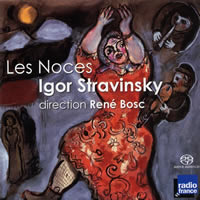Igor Stravinsky's cantata Les noces (The Wedding) had a complicated gestation that reveals several different strands of his thinking during the years around World War I. His idea for the work arose around 1913, and he worked on it along with The Rite of Spring, which it resembles rhythmically.
Originally he intended the work for an orchestra of similar size, but the music pointed him in the direction of the tighter, sparser language he would soon adopt, and he abandoned that idea. Later he worked on a score that included mechanical pianos, an idea much in the air at the time. This version, heard on the present recording, was discarded after the first two movements were completed (because of problems with the specified cimbaloms, not the player pianos), and the work in the form in which it has been heard ever since, with soloists, chorus, and two percussion groups (one of them including four pianos, the other unpitched), was performed with choreography in 1923.
The performance of the earlier version here by René Bosc, leading the Choeur de Radio France (singing in the original Russian, which was extracted by Stravinsky himself from collections of Russian wedding songs), is not the first, but it's not exactly a common item, and its presence throws the musical issues of this troublesome work into sharp relief. Stravinsky experimented during this period with folk materials, with the mechanical pianola (the presence here of the little Étude, pour pianola, of 1917 is a nice bonus), and with a streamlining of his musical language. All of these showed up in the final work, which nevertheless bore many signs of its contemporaneity with The Rite of Spring. Bosc's reading of the main attraction recognizes that; he respects the dimensions of the work with spacious textures, big dynamic contrasts, and seamlessly integrated vocal soloists. It's an exciting reading. Yet it's also one that brings out its various creative threads.
Some may object to the album's short total duration; it clocks in at just under 36 minutes, and there are other works, including the under-performed and highly relevant Pribaoutki for voice and chamber ensemble, that could have been added. The CD booklet is in French only, and lacks texts at that, an odd omission in a work where prosody is of crucial importance. But the music-making itself is unimpeachable.
(James Manheim)
|

